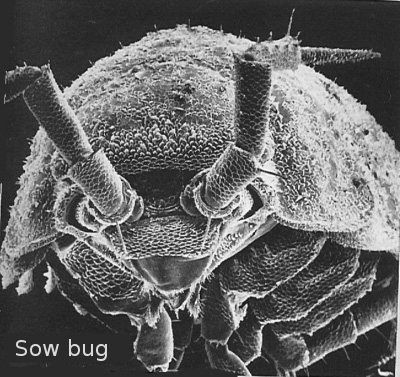
Decomposers in the soil
 Root exudates aren't the only products
plants provide to
the soil food web. Dead plants (and animals too) add organic
matter to the soil, spawning an entirely different web of soil
microorganisms.
Root exudates aren't the only products
plants provide to
the soil food web. Dead plants (and animals too) add organic
matter to the soil, spawning an entirely different web of soil
microorganisms.
Bacteria are great decomposers of fresh, green plant matter, while
fungi prefer the more difficult to decompose lignin and cellulose found
in many tree leaves and in wood. Protozoa and nematodes help too,
although they also enjoy munching on the microorganisms smaller than
themselves (and on each other.)
But most decomposers are too small to eat debris on their own.
Instead, they depend on soil arthropods (like sowbugs, millipedes, and
ants) to chew up the debris for them. The soil arthropods come
back later when the bacteria and fungi have multiplied and the debris
is well decomposed to get their reward --- the released nutrients in
the organic matter and the tasty bodies of the decomposers themselves.
And don't forget the plants. What do they get out of this mess of
soil life? Nutrients, of course. At each stage in the
decomposition process, some nutrients leach out into the water and get
hungrily sucked up by the plants whose roots run through the whole
ecosystem.
| This post is part of our Living Soil lunchtime series.
Read all of the entries: |
Want more in-depth information? Browse through our books.
Or explore more posts by date or by subject.
About us: Anna Hess and Mark Hamilton spent over a decade living self-sufficiently in the mountains of Virginia before moving north to start over from scratch in the foothills of Ohio. They've experimented with permaculture, no-till gardening, trailersteading, home-based microbusinesses and much more, writing about their adventures in both blogs and books.
Want to be notified when new comments are posted on this page? Click on the RSS button after you add a comment to subscribe to the comment feed, or simply check the box beside "email replies to me" while writing your comment.
